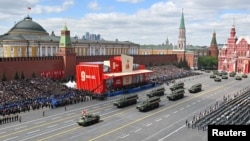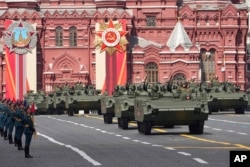Eighty years after the surrender of Nazi Germany, Russian President Vladimir Putin had plenty to say about it and the unparalleled destruction that the Soviet Union suffered during World War II.
Not so much about that other war, the largest in Europe since World War II: Russia's invasion of Ukraine.
In fact, except for a passing mention of what Putin calls the "special military operation," there was none at all.
It might be a coping mechanism. Or it might be a split-screen visual. Or simply a reflection of the Gordian Knot that the Kremlin has tied for itself in a conflict that has devastated Ukraine but also inflicted more casualties on Russia than all the wars it has fought since 1945.
The war on Ukraine is tangled up in what the Kremlin calls "root causes." That's largely a euphemism for Moscow's version of 20th-century history, in which the Soviet Union helped lead the Allies to liberate Europe and then impose four decades of authoritarian, Communist rule over much of it.
The variables of the Kremlin's twisted calculus include the false claim that Ukraine is now controlled by neo-Nazis who helped engineer a coup 11 years ago, driving out a president with Russian sympathies and persecuting Russian speakers in eastern Ukraine.
No less important a variable: the assertion that United States and NATO betrayed Moscow when the alliance embraced former members of the Warsaw Pact -- the Czech Republic, Poland, Hungary, and others -- in the subsequent years.
"We remember the lessons of World War II, and we will never agree with distortion of its events, with attempts to justify the executioners and slander the real winner," Putin said during the May 9 speech. "Truth and justice on our side. The entire country, all of society, the people support the participants of the special military operation."
In the speech, which at 10 minutes was one of the shortest Victory Day speeches in the 26 years he has been Russia's dominant political leader, Putin offered a corrective, or a retort, to US President Donald Trump.
Two days earlier, Trump asserted that "victory was mostly accomplished because of [the United States], like it or not. We came into that war. We won that war."
That's heresy in Moscow, where the memories of the 20-plus million Soviet war dead remain in sharp focus, as does the Battle of Stalingrad, the cataclysmic clash that most historians consider to be a major turning point in the war.
"We will always remember that the opening of the second front in Europe -- after the decisive battles on the territory of the Soviet Union -- brought victory closer," Putin said, a reference to the Allied invasion of Normandy, 16 months after Stalingrad.
In contrast to past speeches, Putin was restrained in his bashing of the West. For example, in 2007, he likened the United States to the Third Reich. In 2022, months after launching the Ukraine invasion, he accused the United States of "humiliating… the whole world."
So What About Ukraine?
The Ukraine invasion has been trending favorably for Russia as its forces grind down outmanned and outgunned Ukrainian troops on the battlefield.
Diplomatically, Trump's efforts to prioritize a resolution of the conflict broke the isolation of Putin, imposed by Trump's predecessor, Joe Biden, with support of Western allies.
The Trump administration has signed onto several core demands for the Kremlin, some of which Putin used to justify going to war in the first place. That includes recognizing Russia's claim to Ukraine's Crimean Peninsula, and blocking Ukraine from future membership in NATO.
More recently, there's been a shift in the Trump administration tone. Trump's vice president, JD Vance, this week said Russia was "asking too much" in the peace talks.
Putin announced a three-day cease-fire to coincide with Victory Day celebrations. Ukraine's Volodymyr Zelenskyy rejected that, calling it a theatrical show, and countered with a proposal for a 30-day halt in fighting. Kyiv has also accused Russia of massive violations of its own truce, and Russia has leveled similar accusations.
For weeks, Kyiv and Moscow have cudgeled each other using drones and missiles with increasing intensity. On May 7, Ukraine reportedly launched more than 500 drones and 11 missiles and glide bombs on Russian targets, the Defense Ministry claimed.
On May 8, the eve of Russia's celebrations, Trump endorsed the 30-day proposal and threatened sanctions "if a cease-fire is not respected" by either country.
The endorsement followed a phone call with Zelenskyy, who has a fraught history with Trump. Ukrainian lawmakers also blessed a major deal giving US companies privileged access to Ukraine's valuable minerals, something on which Trump had conditioned US support.
Cudgeling Ukraine with accusations of "Nazism" draws from the Kremlin's selective reading of the 20th century, too, in particular Stepan Bandera, the Ukrainian nationalist who is revered as a hero by many Ukrainians for leadership in the anti-Soviet independence movement. Others regard him as a traitor whose forces collaborated with Nazi Germany and conducted murderous campaigns against Poles and Jews.
In Putin's 2022 speech, he mentioned both "Western-backed neo-Nazis" in Ukraine as well as "Banderites"-- a Kremlin-favorite epithet used against Ukrainian nationalists.
That rhetoric was absent this year.
But also absent was any indication that he was contemplating ending the Russian invasion.
"Putin does not intend to end the war. He is not changing the goals he started with," Igor Yakovenko, a former Russian journalist and lawmaker who is now an exiled sociologist, told Current Time ahead of the speech.
"The aim of the war is obvious. It has been couched in two euphemisms: 'de-Nazification' and 'de-militarization.' Translated into plain language, this means stripping Ukraine of its military and destroying the Ukrainian state," he said.













